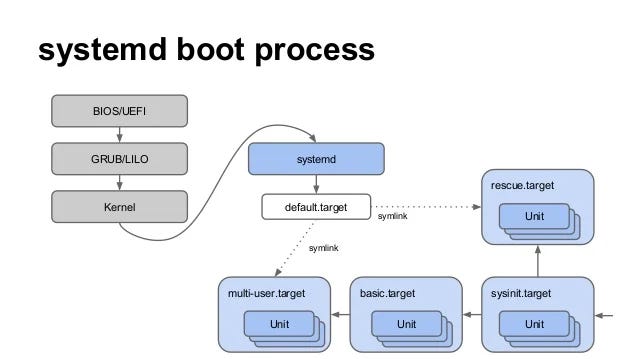Systemd, SysVinit, runit, and OpenRC: A Brief Overview and the Flame Wars Around Them
In the world of Linux, the debate over init systems has sparked heated discussions, often referred to as "flame wars." These discussions revolve around different approaches to system initialization and service management, with Systemd, SysVinit, runit, and OpenRC being the key players.
SysVinit: The Traditional Approach
SysVinit, the traditional init system used in UNIX and Linux systems, has been around since the 1980s. It follows a straightforward approach to system initialization: it runs a sequence of scripts in a specific order to bring the system to a usable state. These scripts are organized into "runlevels," each representing a different state of the system (e.g., single-user mode, multi-user mode). SysVinit's simplicity and long history made it the default choice for many Linux distributions for decades. However, it has limitations, such as slow boot times and difficulty in managing services and dependencies dynamically.
Systemd: The Modern Contender
Systemd, introduced in 2010, is a more modern and comprehensive init system that seeks to address many of SysVinit's shortcomings. It offers parallelization capabilities, which significantly speed up the boot process, and introduces a unified way of managing services, daemons, and various system components. Systemd also includes features like socket activation, logging, and service dependency management, making it more than just an init system—it's a suite of tools for managing the entire system. Despite its technical advantages, Systemd has been controversial. Critics argue that it's overly complex, monolithic, and goes against the UNIX philosophy of "do one thing and do it well."
OpenRC: The Lightweight Alternative
OpenRC is an init system that originated in the Gentoo Linux community. It was designed to be a lightweight and more flexible alternative to SysVinit, while still maintaining compatibility with it. OpenRC uses dependency-based service management, allowing it to start services in parallel and handle complex dependency chains more effectively than SysVinit. While OpenRC is seen as a middle ground between SysVinit and Systemd, it hasn't gained as much widespread adoption, being primarily used in distributions like Gentoo and Alpine Linux.
runit: The Simplicity Advocate
Runit is another alternative init system, known for its simplicity and speed. It is designed to be a minimalistic, reliable, and fast init system, offering quick boot times and a straightforward approach to service management. Runit uses a three-stage initialization process and treats services as individual scripts, making it easy to understand and modify. While it is highly respected in niche communities and used in distributions like Void Linux, its minimalistic approach isn't suitable for every use case.
The Flame Wars: Philosophical and Practical Debates
The debates, often referred to as "init system wars," are fueled by differing philosophies, practical concerns, and the impact of these systems on the Linux ecosystem.
1. Philosophy and Complexity: The primary divide is between the UNIX philosophy of simplicity and modularity versus the complexity and integration offered by Systemd. Systemd's critics argue that it violates the "do one thing and do it well" principle, as it has absorbed various system management functions that were traditionally handled by separate tools. Supporters, however, argue that this integration leads to better performance, consistency, and a more cohesive system.
2. Control and Choice: Systemd's widespread adoption in major distributions like Debian, Ubuntu, and Fedora has led to concerns about monoculture and reduced user choice. Some users and developers feel that Systemd's dominance has marginalized other init systems and limited the freedom to choose alternative solutions. This has sparked movements like Devuan, a Debian-based distribution that rejects Systemd in favor of SysVinit.
3. Practical Considerations: From a practical standpoint, Systemd offers many modern features that are difficult to replicate with older or simpler init systems. For instance, its handling of dependencies, logging (through journald), and socket activation are highly valued in enterprise and server environments. However, these features come at the cost of increased complexity, leading some users to prefer more lightweight systems like OpenRC or runit.
4. Community and Culture: The debates around init systems are also reflective of broader cultural divides within the Linux community. On one side are users who prioritize stability, simplicity, and the UNIX philosophy; on the other are those who embrace innovation, efficiency, and modernity, even if it means breaking from tradition.
Conclusion
The flame wars around Systemd, SysVinit, runit, and OpenRC are emblematic of the diversity within the Linux community. Each init system represents a different approach to system management, with its own set of advantages and trade-offs. While Systemd has become the dominant player, the existence of alternatives like SysVinit, runit, and OpenRC ensures that users can still choose the system that best fits their needs and philosophy. The debates, though often heated, are a testament to the passion and diversity of thought within the open-source world.


